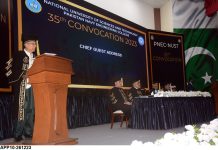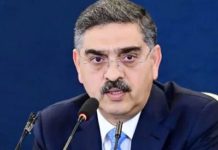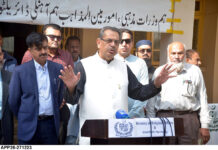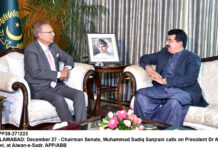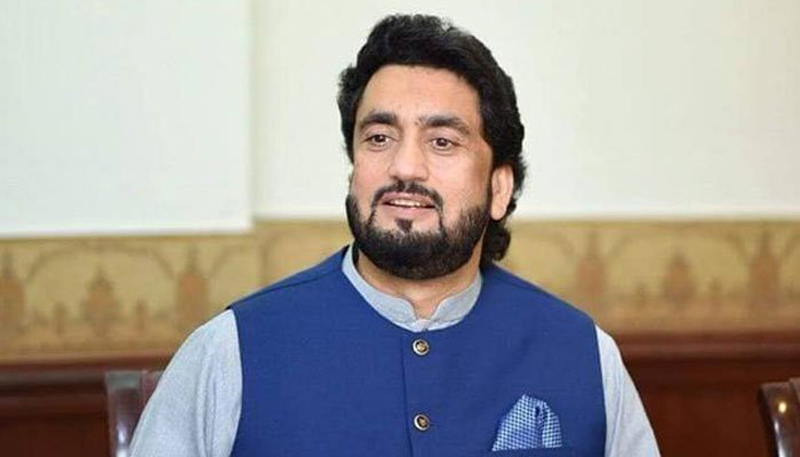
The overall regional security situation, Afghan peace dialogue, Afghan refugee policy, refugees’ welfare and reparation plan came under discussion during the meeting. The US delegation assured the minister of the continued contribution and support of the US government for the Afghan refugees with same spirit and commitment.
Alice Wells also appreciated and acknowledged Pakistan’s continued and generous support and hospitality of millions of Afghan refugees over the past forty years. She said that the US government also acknowledges Pakistan’s support in hosting the protracted refugee population despite its financial constraints and limitations.
She hoped that the refugee reparation would be done in a peaceful and dignified manner, keeping in view the prevailing situation in Afghanistan.
Wells also discussed the prospects of issuance of visa and passports to different Afghan segments presently living in Pakistan and encouraged government of Pakistan to explore and avail the economic contribution of Afghan refugees towards Pakistani economy.
Shehryar Afridi, while appreciating the consistent support of USA both in diplomatic area as well as in financial terms, said that Afghan refugees are being provided with the best possible treatment during their temporary stay in Pakistan.
“The exemplary relations between the host communities and Afghan refugees could best be explained as no untoward incident has ever taken place during the past forty years of stay of refugees in Pakistan,” said the minister.
Afridi conveyed the concerns of Government of Pakistan to the US government over dwindling international support and burden sharing of refugee hosting by the World community which further burdens Pakistan’s fragile economy.
“Due to the dwindling international support for refugees, the public services in education and health sectors are under stress. Thus, generous and predictable contribution would be required from both traditional and non-traditional donors. To meet the rising financial resources, combined and concerted effort needs to be initiated by all stakeholders through the UNHCR,” the minister observed.
Afridi also expressed concerns over the new global approach of combining humanitarian and development assistance for refugee population along with mainstreaming policy in education and health sectors.
“Under the dwindling financial situation, Pakistan’s education, health, and economic/financial sectors would face extreme stress as catering for our own population is already a great challenge and a gigantic task,” he said and added that the world needs to play its role in sharing the refugee burden.
Both the sides agreed to regularly meet and exchange views on the important issues which not only would be helpful for the refugees in their temporary stay and their repatriation to their home while it would also benefit the host communities.
Separately, the US delegation led by Alice G Wells on called on Adviser to Prime Minister on Finance and Revenue Abdul Hafeez Shaikh at the Finance Division.
Hafeez Shaikha briefed the visiting delegation on measures pertaining to economic reforms being undertaken by the government of Pakistan to ensure economic discipline, efforts being made towards implementation of FATF Action Plan and the key challenges being faced.
He emphasized the importance of bilateral engagement with the US and the need to encourage entrepreneurs from private sector of both the countries which will lead to enhanced trade.
The Adviser to PM on Finance informed that over the past three months, the government has taken significant steps to bring financial discipline that include reduction in Current Account deficit, focus on increasing revenue generation, measures to reduce fiscal expenditures, reduce fiscal borrowings, efforts to enhance foreign exchange reserves through bilateral and multilateral support, arrangement of petroleum credit facility with KSA and IDB and IMF Program. Further, as part of its institutional development initiative, SBP and FBR are being resourced and empowered.
At the same time to support economic growth and facilitate the people below the poverty line, various Programs to support our export oriented industries and health insurance schemes have been introduced for the poor.
Regarding, implementation of FATF Action Plan, Abdul Hafeez Shaikh briefed that the government is putting in all-out efforts to complete the Action Plan, involving all relevant authorities at the federal and provincial levels, supported by capacity building through international partners.
He expressed the government’s commitment to enhance the effectiveness of its AML/CFT Framework being undertaken by the government of Pakistan, with the objective to ensure that all the actions that are being taken to curb Terror Financing are irreversible and sustainable.
The Adviser to PM urged for continued support of the international community for strengthening of the AML/CFT Framework over a longer period of time.
Ms. Alice G. Wells appreciated the briefings and expressed that the US would continue to remain engaged with Pakistan in its economic reforms efforts and help build an environment that facilitates business development between the two countries.



